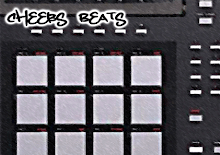Hey folks! Here is a list of a few things you should take into consideration when you go to sample something off of a record. Feel free to comment and leave more tips that you found, this is just a quick list of some of the more important ones. Enjoy!
1 - Watch the meters, don't clip
When you go to sample a record, play it through one time and make sure it doesn't clip or distort at any parts. The dynamic range on records used to vary so much because they didn't compress the crap out of everything like they do today. This means that it isn't consistent and may cause distortion on a few places if you have it turned up too high. Clicks and pop's are OK, but the music or sound you are trying to capture should not clip at all.
2 - Clean the needle and record
It sounds like a no brainer, but keep your needle and record clean to get the best quality sample. I use rubbing alcohol, undiluted for the maximum strength. Some people dilute with water, if you do that use distilled water to minimize residue after it evaporates. I have also used Windex and that seems to work well. Use a towel that will leave the least amount of lint behind, I use a nice soft paper towel and that works well. Pour some on the towel or record, I pour it on the record if it is really trashed, and then slowly turn the album and hold pressure on the record. Do a few spins and then let it dry.
For the needle I just fill the cap of the rubbing alcohol bottle up with a little bit of the alcohol and dip the tip of the needle in it. Then I softly press the end of the needle on a paper towel or old t-shirt. You will see a little black spot if it was dirty.
3 - Use belt drive table
Direct drive tables are good for scratching because the motor can get back up to speed quicker than most belt drive tables. The downside is since the motor is connected to the plate, there is a slight amount of motor noise. Belt drives have a rubber belt that connects the two together and makes it spin. There isn't the fast pick up speed, but it kills the motor noise and gives you a cleaner sample.
4 - Minimize line noise
Line noise is the hiss or buzz you might hear in noisy equipment. This is due to, in most part, low quality parts. Behringer is a very noisy brand that is popular because it is cheap, but remember that you get what you pay for. Noise can also be caused by improper grounding, unbalanced cables, florescent lights and other things. It is impossible to get rid of all the noise, but you can cut it down a lot.
Have a good day and feel free to add your own comments or tips.
-Cheebs
Subscribe to:
Post Comments (Atom)







No comments:
Post a Comment